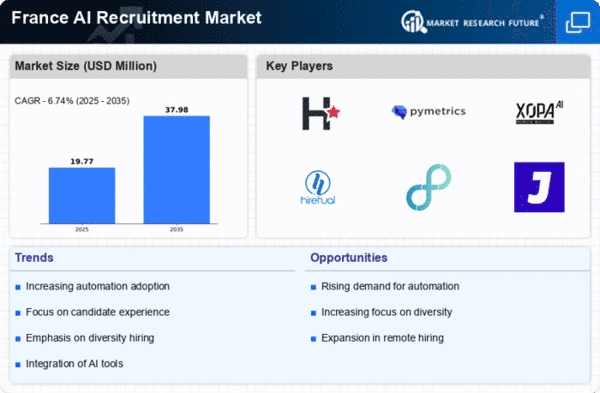Growing Demand for Talent Acquisition Solutions
The ai recruitment market in France is experiencing a notable surge in demand for innovative talent acquisition solutions. As organizations strive to enhance their hiring processes, the integration of AI technologies appears to be a pivotal strategy. In 2025, the market is projected to grow by approximately 15%, driven by the need for efficient candidate sourcing and selection. Companies are increasingly recognizing the potential of AI to streamline recruitment workflows, reduce time-to-hire, and improve overall hiring outcomes. This trend is particularly pronounced in sectors such as technology and healthcare, where the competition for skilled talent is fierce. Consequently, the ai recruitment market is likely to witness a proliferation of AI-driven platforms that cater to the evolving needs of employers seeking to attract top talent.
Regulatory Compliance and Data Privacy Concerns
In the context of the ai recruitment market, regulatory compliance and data privacy concerns are becoming increasingly salient in France. With the implementation of stringent data protection regulations, such as the General Data Protection Regulation (GDPR), organizations must navigate complex legal frameworks when utilizing AI in recruitment. This has led to a heightened focus on ensuring that AI systems are designed to comply with these regulations, thereby fostering trust among candidates. As a result, companies are investing in AI solutions that prioritize data security and ethical considerations. The ai recruitment market is likely to evolve in response to these challenges, with a growing emphasis on transparency and accountability in AI-driven hiring practices.
Rising Investment in AI Technologies by Startups
The ai recruitment market in France is witnessing a surge in investment from startups focused on developing AI-driven recruitment solutions. In 2025, venture capital funding for AI recruitment startups is projected to reach €500 million, reflecting the growing interest in innovative hiring technologies. These startups are often at the forefront of creating cutting-edge tools that enhance candidate matching, streamline application processes, and improve overall user experience. The influx of capital is likely to accelerate the development of novel AI applications tailored to the specific needs of the recruitment industry. As a result, the ai recruitment market is poised for rapid transformation, with new entrants challenging established players and driving competition.
Shift Towards Remote Work and Virtual Recruitment
The shift towards remote work has significantly influenced the ai recruitment market in France. As organizations adapt to new work paradigms, the demand for virtual recruitment solutions has surged. In 2025, it is estimated that over 60% of companies will incorporate AI technologies to facilitate remote hiring processes. This transition not only broadens the talent pool but also necessitates the development of AI tools that can effectively assess candidates in a virtual environment. The ai recruitment market is thus witnessing an influx of platforms that leverage AI to enhance remote interviewing, candidate evaluation, and onboarding processes. This trend underscores the importance of flexibility and adaptability in recruitment strategies, as companies seek to attract talent from diverse geographical locations.
Integration of Advanced Analytics in Recruitment Strategies
The integration of advanced analytics into recruitment strategies is reshaping the ai recruitment market in France. Organizations are increasingly leveraging data-driven insights to inform their hiring decisions, thereby enhancing the effectiveness of their recruitment efforts. By utilizing AI algorithms to analyze candidate data, companies can identify patterns and trends that inform talent acquisition strategies. This approach is expected to lead to a 20% improvement in hiring accuracy by 2026. The ai recruitment market is thus evolving to incorporate sophisticated analytics tools that empower recruiters to make informed decisions based on empirical evidence rather than intuition. This shift towards data-centric recruitment practices is likely to enhance overall organizational performance and employee retention.
















